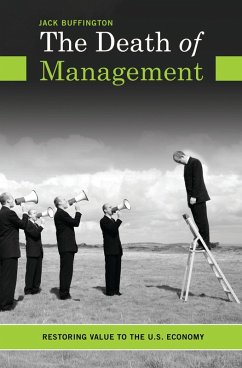Management as we know it has been the driver of business growth in U.S. economies for a couple of centuries. Yet the practice of management is no longer focused on creating real value. Instead, it is now all about using sophisticated financial techniques-and practices like outsourcing and downsizing, among others-to improve profitability. Such addition through subtraction results in higher profits in the short term but puts the corporation and its employees at risk in the long term-not to mention the entire U.S. economy. Innovation and productivity improvement, corporate manager Jack Buffington argues, are lost arts in American business. So is getting back to basics the answer? Buffington's provocative thesis: Management as we know it probably can't be repaired. It must be replaced. Asian economies, meanwhile, are growing by leaps and bounds thanks in part to short-term, ill-advised decisions made by U.S. managers. Local companies and divisions of multinational organizations in emerging countries are on track to eventually overtake those of the West, putting our job base and prosperity at peril. If we want to bring manufacturing jobs back here to the U.S., corporate managers must seek productivity and innovation improvements in U.S. operations. Jack Buffington knows all too well how quickly things can go downhill for U.S. businesses. Turned into a relentless cost-cutter by the forces of globalization and Wall Street's expectations for short-term gains, he-like thousands of other U.S. executives-has watched some of the companies he's worked for disappear for want of real value. Whereas America once prized managers who displayed skill in optimizing the interplay of capital, labor, and technology to grow a company, today's professional manager is rewarded more often for being a cost cutter than an innovator. Fortunately, this book not only outlines the problem, it outlines the solution as well by establishing a 21st-century definition of management that will succeed in today's global economy. Rather than angling to produce a penny more of earnings per share to please the financiers, corporate managers will see once again how to use their ingenuity to produce products, services, and business processes that not only provide generous profits but sustain a business-and its jobs-for years to come. By heeding Buffington's call, the U.S. can rekindle its zeal for innovation, leading to an era in which consumers, workers, investors, and managers all prosper.
Bitte wählen Sie Ihr Anliegen aus.
Rechnungen
Retourenschein anfordern
Bestellstatus
Storno









